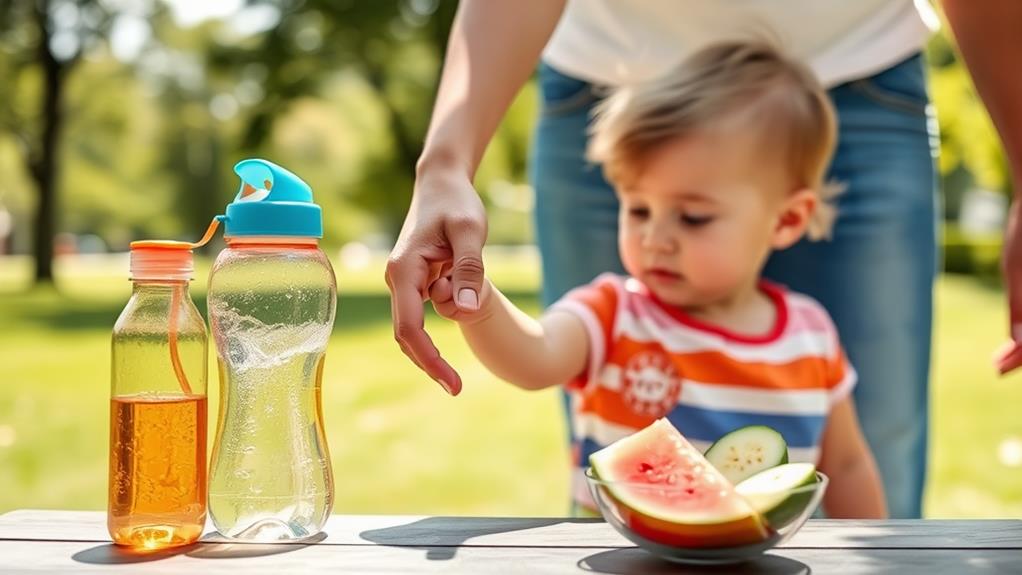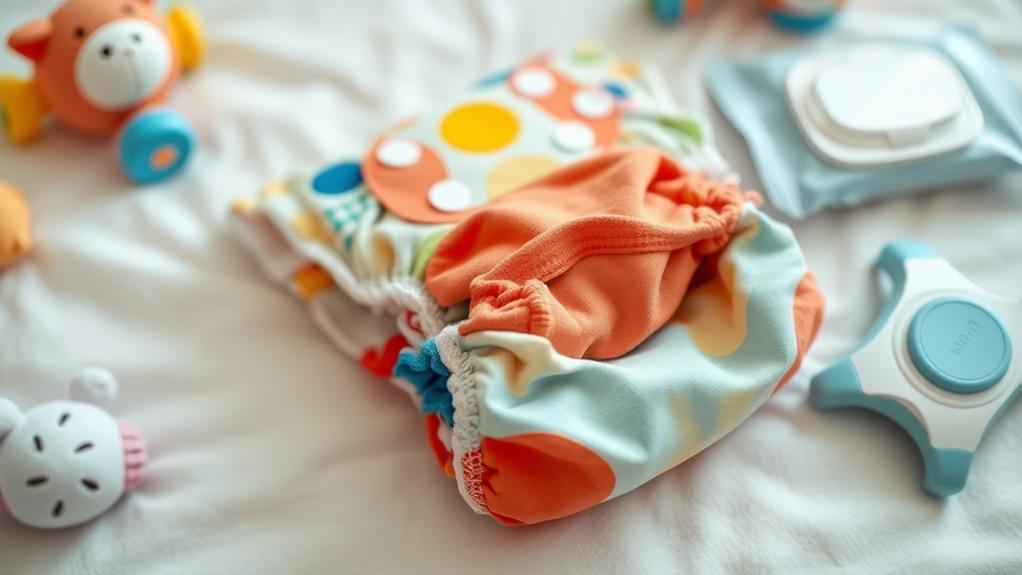When your baby starts coughing, it can be concerning, and it's crucial to understand what's happening. You'll want to pay attention to the symptoms, like whether the cough is dry or wet, and any accompanying signs such as changes in appetite or behavior. The causes can vary widely, from simple irritants to more serious infections. Knowing how to treat and prevent these coughs can make a significant difference in your baby's comfort and health. But how do you know when it's time to consult a pediatrician? Let's explore this further.
Understanding Baby Coughs
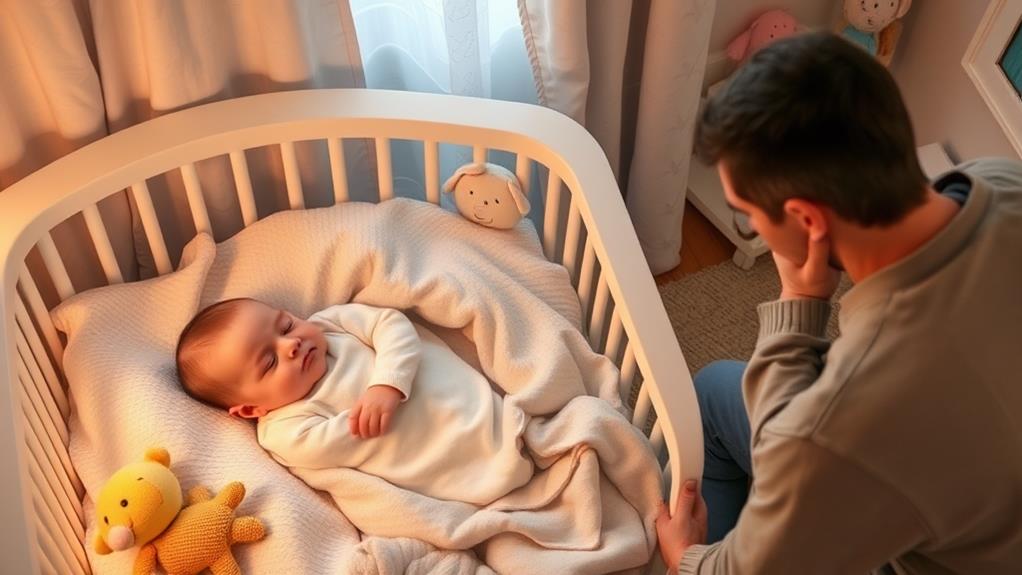
When your little one starts coughing, it can really knock you off your feet. You might wonder, "What's going on?" Coughing is actually a normal way for babies to clear their airways. It's like their tiny bodies have a built-in alarm system that goes off when something doesn't feel right. Sometimes, that cough is just a reflex, but it can also signal something more serious.
As a parent, you'll want to pay attention to the type of cough your baby has. Is it dry and scratchy, or is it wet and phlegmy? Each type tells a different story. A dry cough might mean irritation in the throat, while a wet cough could indicate mucus buildup. Knowing the difference can help you decide when to seek advice.
Don't forget, babies have smaller airways, so even a little cough can sound louder than it is. If your baby seems comfortable and playful, it might just be a passing phase.
But if you're ever in doubt, trust your instincts. A quick call to the pediatrician can ease your mind, and remember—you're not alone in this parenting adventure!
Common Symptoms to Observe
Coughing in babies can come with various accompanying symptoms that you should keep an eye on.
First up, listen closely to your little one's cough. Is it dry and scratchy, or wet and phlegmy? The sound can give you clues about what's going on.
You might also notice your baby's breathing patterns. Are they breathing fast or struggling for air? If so, it's time to pay extra attention.
Watch for any changes in their appetite. If your baby doesn't want to eat or drink, it could be a sign they're feeling unwell.
Fever is another signal to look for. A slight temperature might be normal, but if it climbs too high, it's best to call the doctor.
You should also take note if your baby seems unusually cranky or lethargic. Babies can be fussy sometimes, but if they're not their usual bubbly selves, something might be off.
Finally, if you see any wheezing or a bluish tint around their lips, seek medical help right away.
Keeping an eye on these symptoms can help you find the best care for your little one.
Possible Causes of Coughing
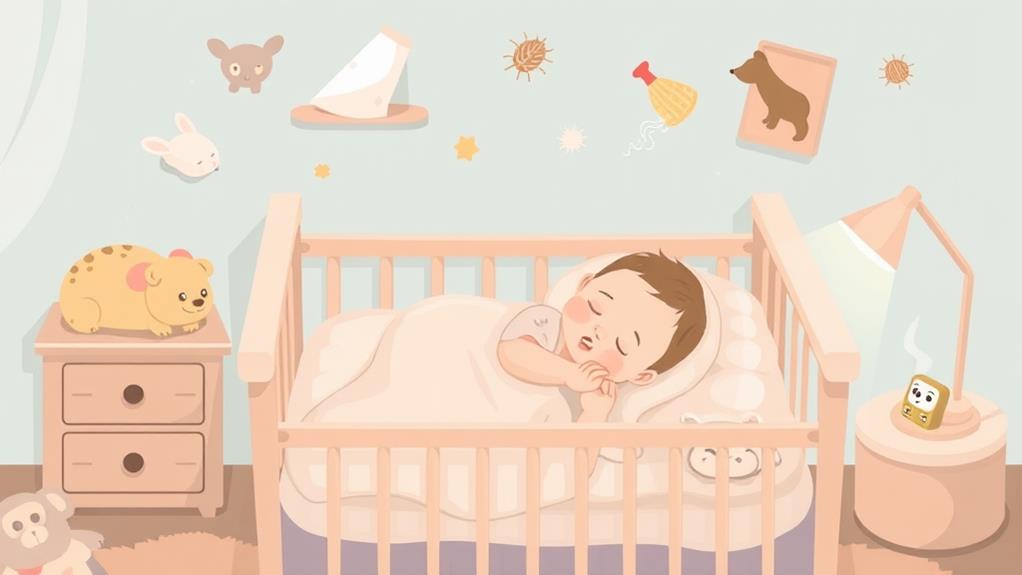
Understanding the possible causes of your baby's cough can help you determine the best course of action. Coughing in babies can happen for a variety of reasons, and it's important to know what might be going on.
Sometimes, it's just a little tickle in their throat, maybe from dry air or some dust. Other times, it could be due to allergies, like pollen or pet dander, which can make them sneeze and cough.
Infections, such as a cold or respiratory syncytial virus (RSV), can also lead to coughing fits. If your baby's cough sounds like a bark, it might be croup, which is common in young kids.
Sometimes, even something as simple as teething can cause them to cough. Saliva can build up, and they might cough to clear their throat.
Lastly, exposure to smoke or strong odors can trigger a cough, so it's best to keep their environment clean and fresh.
When to Seek Medical Attention
Recognizing the signs that indicate when to seek medical attention for your baby's cough is essential for ensuring their health and safety. If your little one has a cough that lasts more than a week, it's time to pick up the phone.
Also, if you notice any wheezing or trouble breathing, don't hesitate to call your doctor. Those tiny chests shouldn't have to work too hard!
You should also take action if your baby's cough is accompanied by a high fever, especially if their temperature hits 100.4°F (38°C) or higher. That could be a sign of something more serious.
If you see your baby turning blue around the lips or face, that's a major red flag—get help immediately.
Lastly, if your baby seems unusually cranky, tired, or isn't feeding well, trust your instincts. You know your baby best, and sometimes, a worried parent is just what the doctor ordered!
Home Remedies for Relief
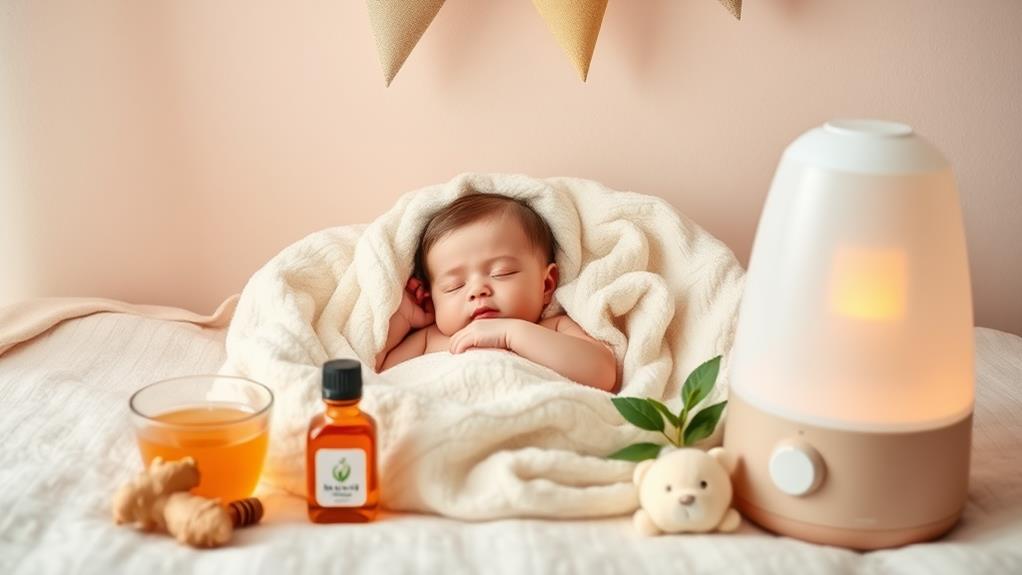
When your baby's cough becomes a concern, finding effective home remedies can provide much-needed relief.
First, try using a humidifier in your baby's room. This adds moisture to the air, making it easier for your little one to breathe. Just remember to clean it regularly, or it might end up doing more harm than good!
Another great option is a warm bath. The steam can help loosen mucus and soothe your baby's throat. Plus, who doesn't love a bubbly bath time?
You can also elevate your baby's head while they sleep by placing a small pillow under the mattress. This helps reduce coughing at night, so you both can get some rest!
Honey is another popular remedy, but only for babies over one year old. Mixing a teaspoon of honey with warm water can ease coughs and soothe their throat. Just make sure you don't give it to younger babies.
Lastly, keep your baby hydrated. Offer lots of fluids, like breast milk, formula, or water, to help loosen mucus and keep them comfortable.
Over-the-Counter Treatments
Many parents wonder about the best over-the-counter treatments to help ease their baby's cough. While it can be tricky to find the right solution, there are a few options to take into account.
First, you might want to try a saline nasal spray. This gentle mist helps clear out nasal congestion, making it easier for your little one to breathe. Just a couple of sprays in each nostril can make a world of difference!
Another option is a humidifier. While it's not a medication, running a cool-mist humidifier can help keep the air moist, which soothes your baby's throat and reduces coughing. Just remember to clean it regularly to avoid mold—yuck!
For older babies, you might find honey helpful. If your baby is over one year old, a teaspoon of honey can work wonders by coating the throat and easing irritation. But, please don't give honey to babies under one year due to the risk of botulism.
Always check with your doctor before starting any over-the-counter treatments, as they can provide personalized advice. Your baby's health is a top priority, and you're doing a great job seeking the best care!
Prescription Medications Overview
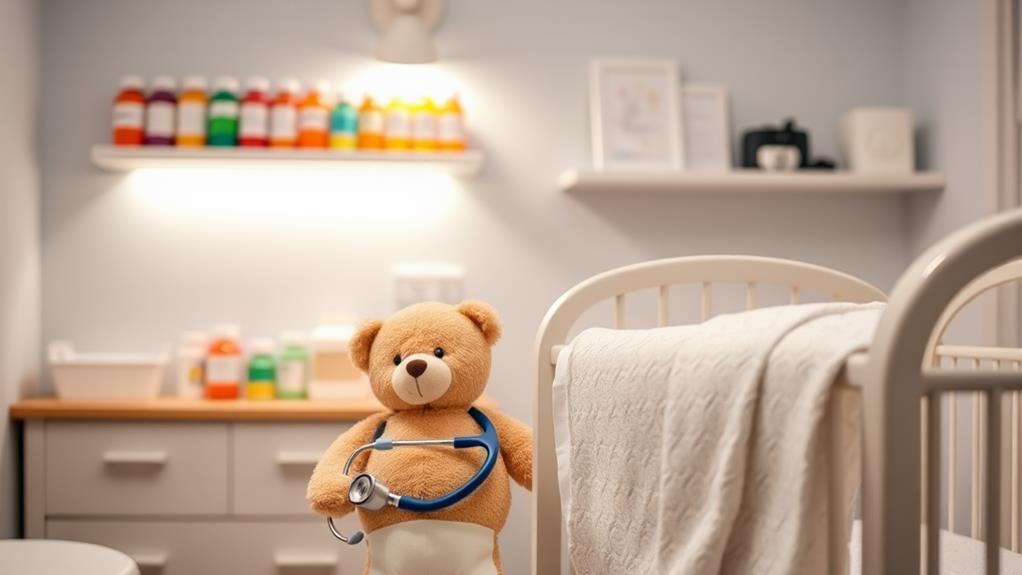
For parents dealing with persistent coughs in their babies, prescription medications can offer targeted relief when over-the-counter options aren't enough. Sometimes, a little extra help is just what your little one needs.
These medications often address specific causes of cough, like allergies, asthma, or infections, giving you peace of mind.
Your pediatrician might prescribe a cough suppressant to help calm that annoying tickle in your baby's throat. Or, they could recommend an expectorant to loosen mucus, making it easier for your baby to cough it out.
If allergies are the culprit, antihistamines may be the ticket to a quieter night. It's important to remember that not all coughs need medication—sometimes, it's just a phase, like that one time your baby thought it was hilarious to splash in the bath!
Always follow your doctor's instructions carefully. And don't hesitate to ask questions. After all, being a parent can feel like a guessing game sometimes!
Keeping a close eye on your baby's symptoms will help you decide when it's time to reach for that prescription bottle. You've got this!
Preventive Measures to Consider
Taking steps to prevent coughs in babies can make a significant difference in their overall health and comfort. First, make sure your baby is up-to-date on vaccinations. These shots help protect them from illnesses that could lead to coughing.
Next, practice good hygiene. Wash your hands often, especially before handling your little one, and encourage family members to do the same. You don't want germs crashing the party!
Another tip is to keep your home smoke-free. Cigarette smoke can irritate a baby's lungs, making them more prone to coughing.
Also, be mindful of allergens like dust and pet dander. Regularly cleaning your living space can help keep those pesky particles at bay.
Don't forget about the air quality! Using a humidifier can add moisture to the air, which might soothe your baby's throat and help them breathe easier.
Lastly, dress your baby appropriately for the weather. Keeping them warm in chilly conditions can prevent illnesses that lead to coughing.
Impact of Environment on Coughing
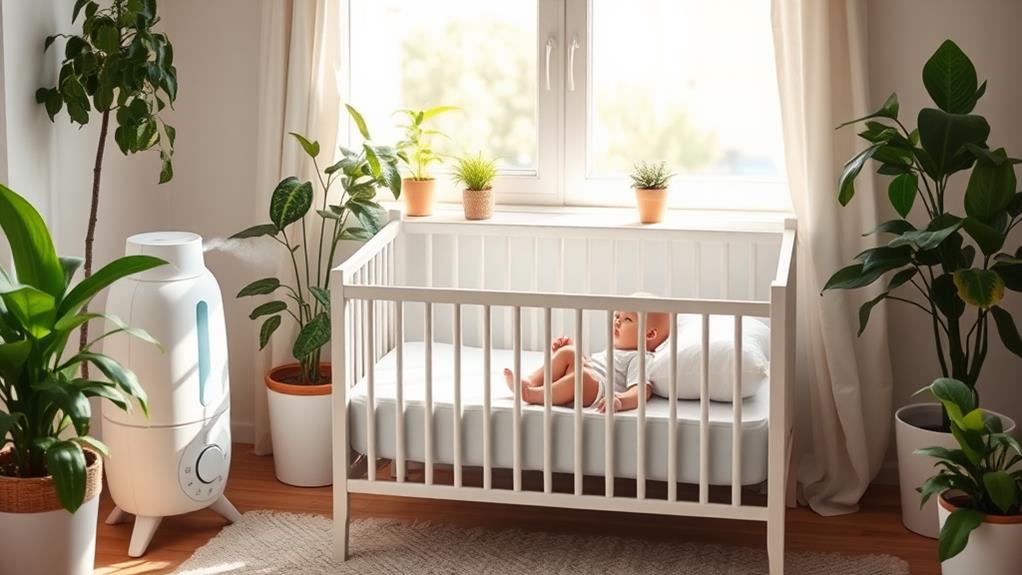
Environmental factors can greatly influence your baby's coughing. When you're at home, think about the air quality. Dust, pet dander, and smoke can all cause irritation, making your little one cough more.
If you've got furry friends, it's a good idea to keep their play area clean and vacuum regularly. And if someone in your home smokes, it's best to step outside for a puff—your baby's health should come first!
Seasonal changes can also play a role. During spring, pollen can lead to allergies, which can trigger coughing. If you notice your baby sneezing or coughing around this time, you might want to keep windows closed and use air purifiers to filter out allergens.
Temperature is another factor. Sudden changes from warm indoors to cold outdoors can make your baby's throat feel scratchy, causing coughing. So, if it's chilly outside, bundle up your little one in cozy layers.
It's all about creating a comfy environment for your baby. By paying attention to these factors, you can help reduce their coughing and keep them feeling their best.
Monitoring Your Baby's Health
Monitoring your baby's health is essential, especially when they develop a cough. You'll want to keep an eye on how often they're coughing and if it seems to bother them. Is it a dry cough, or is there some mucus? These details can help you understand what's going on.
Check for other symptoms too! If your baby has a fever, is breathing fast, or seems extra fussy, it might be time to call your pediatrician. Sometimes, a cough can be just a cough, but other times, it might signal something more serious, like an infection or allergies.
Keep track of when the cough started and any possible triggers, like new pets or smoke in the air. It's like being a detective—every clue counts!
And remember, babies can't always tell you what's wrong, so trust your instincts. If you feel something's off, don't hesitate to ask for help. You're their best advocate!
In the end, staying calm and informed will help you navigate this coughy adventure. With a little observation and care, you'll both get through it just fine!



